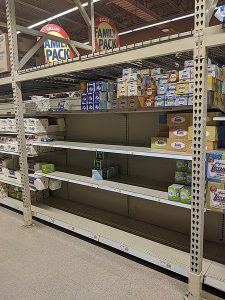In good times, resilience looks a lot like waste, but what’s the benefit of a system too efficient to be useful in times of need?
For over a century, the business community has stressed the virtue of efficiency. Increased efficiency is the cure for all ills, we’re told; it results in higher profits, less waste, greater competitiveness, satisfied customers, and probably makes you smell better, too. From Frederick Taylor’s 1909 classic Principles of Scientific Management, which broke down factory work into a tightly-regulated set of micromanaged motions, to Wal*Mart’s just-in-time delivery model and Amazon’s ruthless data analysis, industry’s obsession with efficiency reinvented processes and supply chains from top to bottom. It worked well as long as nothing went wrong, but it came at the cost of resilience.
In recent weeks, the chaos spawned by the coronavirus crisis has highlighted just how efficient – and how much less resilient – our society has become.
Centralized mass production is incredibly efficient. Rather than having to organize purchases from a multitude of small producers, industries can rely on a few big suppliers, maybe just one. What happens, however, when that source has a hiccup? The results are felt around the world. We learned this the hard way in 2011 when widespread flooding in Thailand hobbled the region where most of the world’s magnetic hard drives are produced. This February, a fire at the one factory that makes a unique type of stylus brought the resurgent vinyl record industry to its knees. A major reason for the current shortage of critical medical supplies like masks and hand sanitizer is the drop in imports from China after the coronavirus disrupted manufacturing. Centralized production decreases resilience in ways that can be catastrophic in times of need.

You may have noticed bare shelves when shopping for essential items as the coronavirus tests our resilience here as well. However, panic hoarding is not (entirely) to blame for the toilet paper shortage. It’s also a supply chain issue. With a significant number of people hunkering down, more of us are pooping at home than at work, in airports, or at school. The cushy two-ply quilted rolls are what’s in short supply, but restaurants and other commercial facilities have a glut of the giant, single-ply recycled rolls that don’t fit in your bathroom holder. Because the toilet paper industry is really efficient at producing two different products for home and business use, they’re unable to retool and create new distribution pathways quickly when demand wipes out supply faster than expected.
If the supermarket selection seems sparse, we have efficiency to thank for that, too. Most of the food we buy is produced at factory farms, miles away from where we eat. Much like toilet paper, a lot of those agricultural products were destined for the same restaurants, hotels, and food courts that are closed right now. As a result, while grocery stores can’t keep enough in stock, there are piles of vegetables rotting in Florida, and Wisconsin dairy farmers are forced to dump their milk since new distribution channels can’t be created as fast as perishable food spoils, and food banks can’t use it either. Creating decentralized food systems would increase our resilience, but at the cost of efficiency. In other words, if Americans produced these foods in backyards, urban greenbelts, and small local farms, it would be harder to sell them to institutions, but they’d be on your dinner table instead of going to waste right now.
Our culture has gone all-in for efficiency, and with good reason. In good times, the redundant systems and extra capacity that create resilience look a lot like waste. Unfortunately, times don’t stay good forever. Even though strong arguments exist for using our diminishing resources more efficiently, there is still a vital need for the kind of small-scale, distributed production that can supply what we need during the chaos of a pandemic or economic collapse.
Related: Instability is the Wave of our Future


Join the conversation!